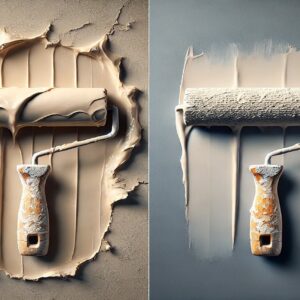Drywall is a construction material that is used to create walls and ceilings. It is made of gypsum plaster pressed between two layers of heavy paper or fiberglass matting.
One of the most common questions that we get asked is, “How much does 5/8 drywall weigh?”. The answer to this question varies depending on the type of drywall used.
For example, a standard 5/8-inch sheet of dry wall weighs approximately 52 pounds. However, the weight will be slightly higher if you use a fire-resistant or moisture-resistant type of sheetrock In general, sheetrock weight is not a major concern for most homeowners. However, if you are working on a construction project where weight is a factor, it is important to know the exact weight of the drywall you will use.
Why is drywall weight important?

Drywall weight is one of the most important factors when calculating the weight of a home. comprises different types of materials, each with its weight. For example, fiberglass insulation weighs about 1/3 less than sheetrock so a wall insulated with fiberglass will be lighter than one that is not. Similarly, gypsum sheeting weighs much less than sheetrock, so walls built with sheets of this material will be considerably lighter. Therefore, when measuring the weight of a home, it’s important to consider all the sheetrock and insulation materials present.
Crazy Amount of 5 8 Drywall is Being Used in Homes
Drywall is being used in homes more than ever before. That is due to the low cost of the material and the easy availability of the product. However, this crazy amount of 5 8 drywall is causing some problems.
Using 5 8 drywall has led to a shortage of the more expensive types of sheetrock. As a result, it caused prices for these types of sheetrock to rise, which has made them more expensive than before. Additionally, there is a risk that this shortage will cause builders to use less quality sheetrock in their construction projects, which could lead to problems.
How Much Does 5 8 Drywall Weigh?
How much does 5 8 drywall weigh? The answer, surprisingly, is not much at all. According to the National sheetrock Association (NDAA), a sheet of 5 8 drywall weighs around 3 pounds. That means a single sheet of sheetrock can cover an area about the size of a tennis court – assuming you’re using the standard weight for 5 8 sheets. But, of course, if you’re looking for something lighter or heavier, that will affect how much each sheet weighs.
What Are The different types of drywall?
A drywall is a wall made up of small sheets of gypsum, paper, and wood. You can use it in many construction projects, such as walls, ceilings, and floors. There are three main types of sheetrock: fiber-reinforced gypsum (FRG), metallic foil-faced gypsum (MFGF), and mineral-fiber reinforced gypsum (MFG). Each has its benefits and drawbacks.
FRG is the most common type of drywall because it’s affordable and easy to use. However, it’s not as strong as MFGF or MGF and doesn’t hold up well to weather conditions. MFGF is more expensive than FRG, but it’s stronger and better able to resist moisture damage.
How Much Does a Sheet of Drywall Weigh?
A sheet of drywall weighs between 18 and 24 pounds per square foot. Therefore, the density of a sheet of sheetrock is around 1,600 pounds per cubic foot. It means a sheet of sheetrock has a volume of 1,600 cubic feet.
To calculate the weight of a single sheet of sheetrock, divide the total weight (in pounds) by the total area (in square feet) covered by the sheet.
Is It Time To Start Considering 5 8 Again?
A lot has changed since the days of 4 and 6-coat drywall. Today’s drywall is made with 5 8 construction, meaning You can apply it with just four coats. Although this construction may seem less durable than traditional sheetrock, experts say it’s more reliable and lasts longer. Plus, installing 5 8 sheetrock is significantly cheaper than using traditional methods. So is it time to start considering this style of construction again?
Did You Know That 5 8 Drywall Weighs the Same as a Brick?
Did you know that 5 8 drywall weighs the same as a brick? sheetrock comprises large sheets of gypsum paper tightly bonded with a special adhesive. That makes it an ideal material for construction because it is light, inexpensive, and easy to work with. In addition, sheetrock is so versatile that it is used in various applications, including walls, ceilings, and floors.
Drywall Weight Calculator
A drywall weight calculator is an online tool that can help homeowners and builders to calculate the weight of drywall panels. The tool uses the wall dimensions and the drywall type to calculate how much each panel weighs.
Drywall weight varies depending on the thickness.
Wall thickness is one of the factors that affect the weight of drywall. Thin drywall weighs more than thick drywall, even though they have the same area. That is because a thin layer of sheetrock has less mass than a thick layer of sheetrock. Therefore, the weight of a sheet of wallboard is proportional to its thickness and inversely proportional to its width.
Drywall Weight per Square Foot
Drywall weight per square foot is important when selecting sheetrock for a project. The weight of the drywall affects the cost, time frame, and quality of the finished product. Therefore, when comparing different types of sheetrock, it is important to consider the weight per square foot.
Three primary types of sheetrock include gypsum board, lightweight board, and medium-density fiberboard (MDF). Gypsum board is the heaviest and, therefore, the most expensive; it has a low strength rating and requires different connections than other forms of drywall. The lightweight board is slightly lighter than the gypsum board and has a higher strength rating; it is less expensive than the gypsum board but more expensive per square foot.
The Benefits of 5/8 drywall
Drywall is one of the most common building materials used in construction. It comprises small, lightweight pieces of paper-thin material that are stuck together to form a wall or ceiling. Dry wall is a popular choice for new construction because it is inexpensive and easy to install.
There are a lot of benefits to using dry wall. First, it’s extremely durable. Even when it’s damaged, You can usually repair sheetrock relatively easily. That makes it a good choice for regularly used properties and exposure to the elements.
Another benefit of using dry wall is its acoustic properties. Because sheetrock is made up of small pieces of paper-thin material, it has a very low noise level compared to other building materials such as brick or concrete walls.
The disadvantages of 5/8 drywall
Drywall, also known as sheetrock, is a type of wall covering made of thin sheets of gypsum or another plasterboard that are joined together to form a wall. It is the most popular type of construction wall in the United States and is used in residential and commercial applications.
There are several advantages to using gypsum board over other types of construction walls:
- It is relatively easy to install.
- It has a relatively low cost compared to other types of walls.
- It can be easily painted or decorated.
- It is fireproof and water resistant.
- You can soundproof if needed.
- It has a long lifespan and can be reused many times.
- You can easily replace it if it’s damaged or destroyed.
How to Install Drywall
If you’re planning to install dry wall yourself, there are a few things to remember:
- The average weight of a 5/8-inch gypsum board is about 1.3 pounds per sheet. That means a sheet of gypsum board 20 inches wide and 50 inches long will weigh approximately 63 pounds.
- Ensure you have the correct tools and materials before starting your project. You’ll need a drill, saws, screws, nails (and maybe a level), a hammer, and a chisel if you’re cutting gypsum board corners or ceiling tiles.
- Plan your installation carefully; mistakes during the wall building process can lead to weakened walls that require more extensive repairs.
Final Remarks
In closing, I would like to reiterate that the drywall weight is not just a matter of pounds or kilograms. The actual weight of the gypsum board will be determined by its density, measured in pounds per cubic foot. So, if your drywall requires more than 1 pound per square foot of coverage, it will weigh more than 5 8 pounds.












Commented Posts